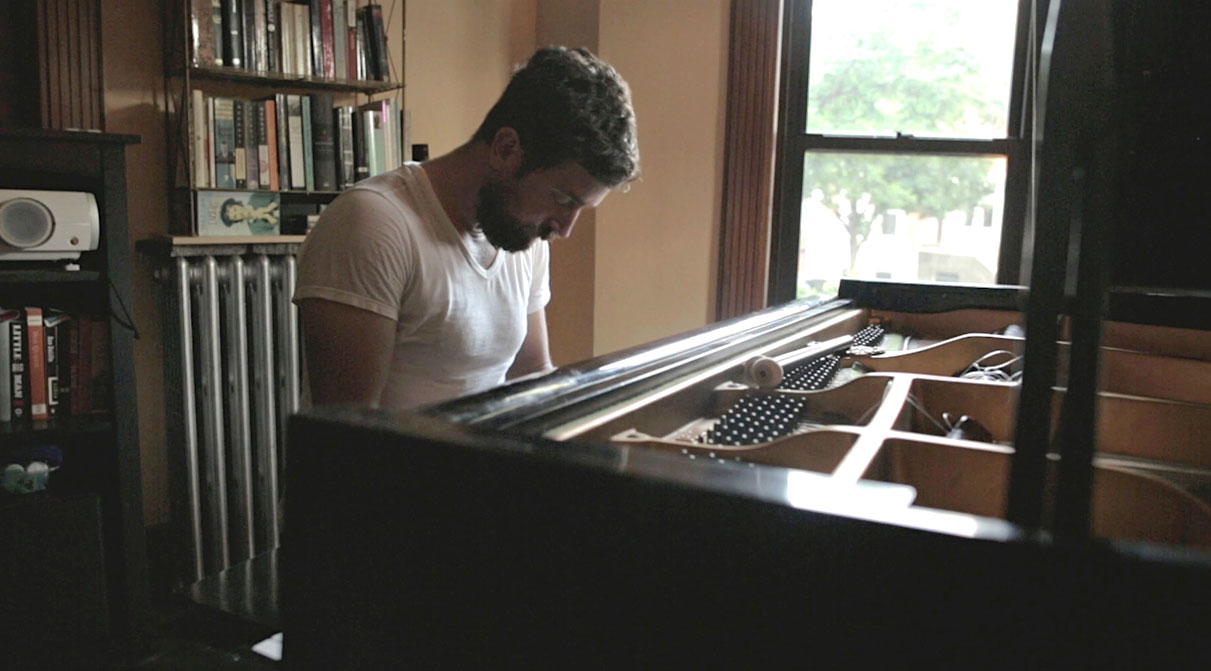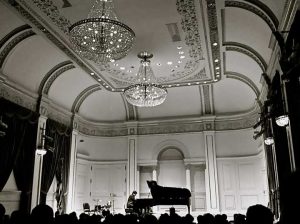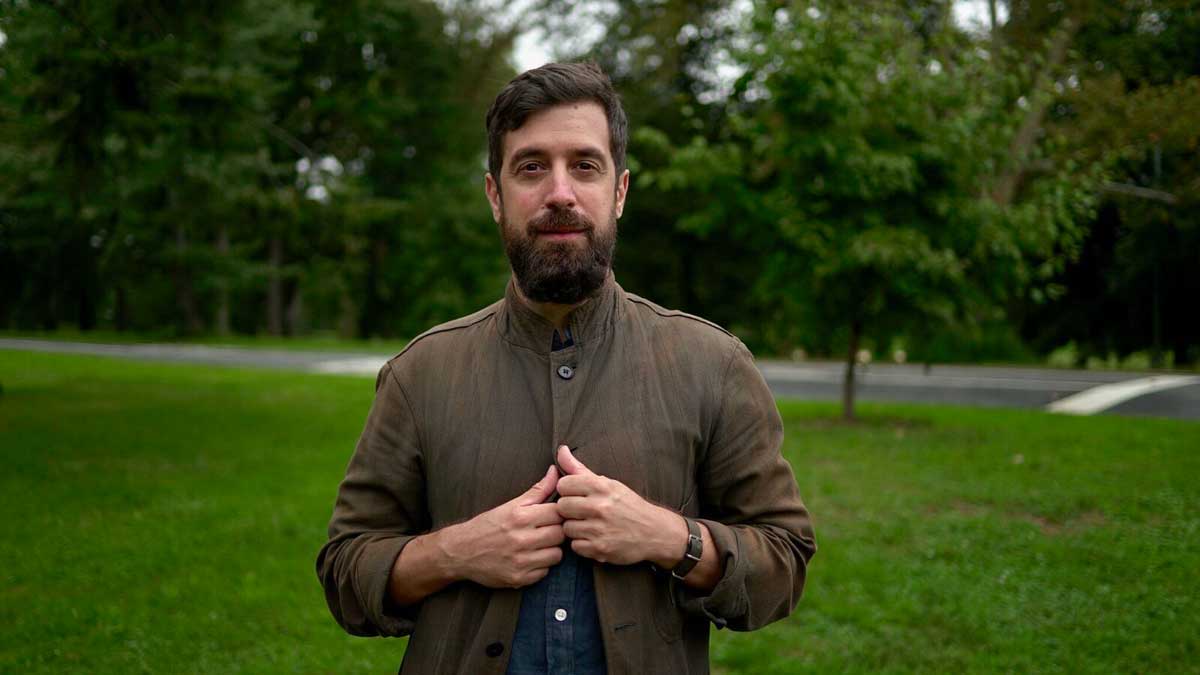
A self-professed “sound junkie” equally absorbed by the hydraulics of jets and the song of Vietnamese street vendors, David Cieri spends mornings at the piano in his Brooklyn studio. (Photo: Francesco Saviano )
He hasn’t won an Oscar (yet!), so David Cieri seems to be getting less attention for The Vietnam War than co-composers Trent Reznor and Atticus Ross, but make no mistake: the virtuoso abilities of this multi-instrumentalist contributed significantly to Ken Burns’ 18-hour epic. The 10-part documentary, co-directed by Burns and Lynn Novick, premieres Sunday on PBS. In addition to score by Cieri, Reznor and Ross it features some work by Yo-Yo Ma and the Silk Road Ensemble as well as 38 touchstone songs of the era by groups including The Beatles, Rolling Stones, Simon and Garfunkle, Jimi Hendrix and Bob Dylan.
The Vietnam War marks the fifth collaboration between Cieri and Burns’ Florentine Films, who worked together on The National Parks: America’s Best Idea (2009), Baseball (2010), Prohibition (2011) and The Roosevelts: An Intimate History (2014). “The beautiful part about working with Florentine — one of many — is most producers give you the film in picture lock and you end up, as [three-time Academy Award-winning sound editor] Walter Murch would say, ‘spraying the music on at the end.’ At Florentine they do it in a way some might feel is backwards, where the music comes first. They really prize their music and don’t want anything to get in the way.” Cieri estimates he provided about two-and-a-half hours of score for The Vietnam War, working in an iterative process in which each cycle informs the next “so a tight weave between picture and music starts to happen” with a mutual influence between the two. “It’s an exciting way to work.”
To prepare for the score, the Brooklyn-based Cieri traveled to Vietnam for two-and-a-half-weeks of research and “to get a sense of the music and soak up the environment.” That step preceded any specific knowledge of the project. “I didn’t want to be hemmed in by any of the logistics but to imagine, in a wide way, musically, what was possible. So going there as a beginner and learning as much as I could.” He describes the street noise he woke up to his first morning in Hanoi as “something I’ll never forget. The vendors and their song, to my my Western ears it was magical. I have a bunch of recordings of them calling out to sell their pho, singing that in their own unique way. That’s their advertising. How they can sing uniquely is how they get customers.”

David Cieri has had several engagements at Carnegie Hall. (Photo courtesy David Cieri)
Cieri’s deep dive included time spent at a conservatory in Hanoi, where he took lessons and watched others receive instruction. “Some were teaching American blues, and it was very interesting to watch how they would interpret that from the other side of the vernacular.” As in life, much of the teaching took place on the streets, “just finding musicians and sitting with them and listening and asking questions. In some cases we’d talk for hours about music.”
A field trip to a tiny village just south of the border with China proved fruitful. “I stayed with a family there for two nights, and not knowing how to speak Vietnamese we found that the music could communicate a lot. We watched a show together called I Sing, which is their version of like American Idol, and we really connected on that, too.”
A ‘Sound Junkie’
Cieri grew up steeped in music in southern New Jersey, just outside of Philadelphia, one of 10 children. His mother was an accomplished harpsichord player and he laughingly recalls “being exposed to more Bach than anyone should have to withstand,” but adds, “I loved every minute of it.” He still has her harpsichord, custom-made by a firm in Boston, now woefully out of tune. “It sounds like glass breaking, but in the best way.” His father was an interior designer and architect who played piano for his own enjoyment. “He was a great musician, but also terrible. The great part was in how much he enjoyed playing.” Cieri said his father taught him a certain sonic spatial appreciation, “what it sounded like to walk into a room” and how entering a church triggered different acoustical sensations than, say, walking into an apartment on the Upper West Side.
Growing up, Cieri never imagined becoming a professional musician. “My whole life I’ve been a sound junkie,” he said, admitting he always been an attentive listener. “I would just come home from school and play the piano until I fell asleep at the keyboard. So it was never a plan, it was more of me following my instinct and curiosity,” he recalls. He attended college in Colorado, majoring in philosophy. It wasn’t until he was in his 30s that Cieri, now 43, decided to pursue a career composing and moved to New York. There, “I kept playing and playing, in all sorts of hilarious circumstances. Yes, I played at the opening of a grocery store. Yes, I played at a miniature golf course.”
One of his early jobs was playing the piano in a hotel lobby he describes as “very David Lynch.” There, his work caught some influential ears. Returning from a break, he found a pair of children tinkling the ivories, so the three of them began to play. When their father came by to collect them he asked Cieri about his musical aspirations. “I had always been interested in history, and wanted to marry that with music, so I said I was trying to figure out how to get into documentary soundtracks, and he laughed and gave me his card.” It was Erik Ewers, supervising editor for Burns at Florentine.
“We stayed in touch, and six months later they had a last minute request for a Scott Joplin rag for National Parks, so they called me.” Eight years later, Cieri has composed for a wide variety of projects including, just this year alone, the Emmy-nominated Oklahoma City and Joan Kron’s subversive look at plastic surgery Take My Nose… Please! He also completed a jazz album, White Dust, with poet Yusef Komunyakaa, released this month on the Ropeadope label.
While each project has its special challenges, The Vietnam War was particularly demanding. “It really pushed me beyond my comfort zone, which is where I like to be,” he admitted. In addition to the environmental sound samples, the project saw him experimenting with a variety of unusual instruments, including the dan bau, a traditional Vietnamese single-stringed zither that dates to 1770. “I got into an empty bathtub with the thing and spent the whole day bowing and recording.” Also included in the soundscape is the tromba marina, a trumpet-like device used in medieval Europe to call the ships.
Possibly the most exotic accessory Cieri used was the waterphone, an instrument invented by an a motorcycle mechanic who noticed that moving his bike with a little gasoline in the tank produced an ethereal, somewhat spooky, warbling sound.
“D.W. Griffith said when asked the point of making movies ‘It’s to capture the wind and the trees.’ I think the waterphone does something sonically similar. For Vietnam, we were dealing with a lot of jungle things and much of the music I wrote is for scenes where you’re waiting for things to happen, uncertain events, scenes bristling with tension. I wanted to capture that sense of what it feels like when you walk outside and know it’s going to start raining, but you don’t really know how you know that. It’s atmospheric. The waterphone is great at illustrating the emotional shape of anticipation.”
Cieri worked on material that ranged from epic battle to the emotionally charged first meeting of Vietnam vets at the memorial. While he creates mainly at his home studio, when he has to venture out to a pro shop his go-to is Figure 8 Recording in Prospect Heights, which he calls “the greatest studio in the world. They really care about music and they know what they’re doing.” In addition to his Yamaha baby grand Cieri’s home set-up includes a Prophet-6 synthesizer “all manner of stringed instruments, amplifiers, a harmonium, some drums and anything I could get my hands on to make sounds over the years.”
With all that at his disposal, Cieri says some of his best audio still comes from unexpected places. Another moment that found its way into his score occurred when after a visit to the Red Dao tribe in Vietnam he hiked 17 miles from the mountains to catch a train back to Hanoi. “I heard a woman washing clothes and singing and it was sublime — a collection of pitches and expressions I had never experienced.” He made a recording and it found into the weave of The Vietnam War. “I took a lot of those recordings and shuffled them into the compositions, so there are little touches that I’ve smuggled in that I hope play some subliminal role in the listening experience. They’re not very prevalent, but they’re in there, because I wanted to literally get the sound of Vietnam into the music.”

David Cieri in Brooklyn’s Prospect Park, where he can sometimes be found wandering with an accordion. (Photo: Francesco Saviano)
2 Responses to "Ken Burns’ Secret ‘Vietnam War’ Weapon: Composer David Cieri"
Comments are closed.


Pingback: Reznor, Ross, Rolling Stones Track ‘Vietnam War’ | MaxTheTrax
I am very impressed by David Cieri’s determination to create the sounds of Vietnam in creative but authentic ways. After watching episode 1 of “Vietnam” last evening, his idea to give shape to the emotion of anticipation rings true. The music is subtle and startling at the same time.